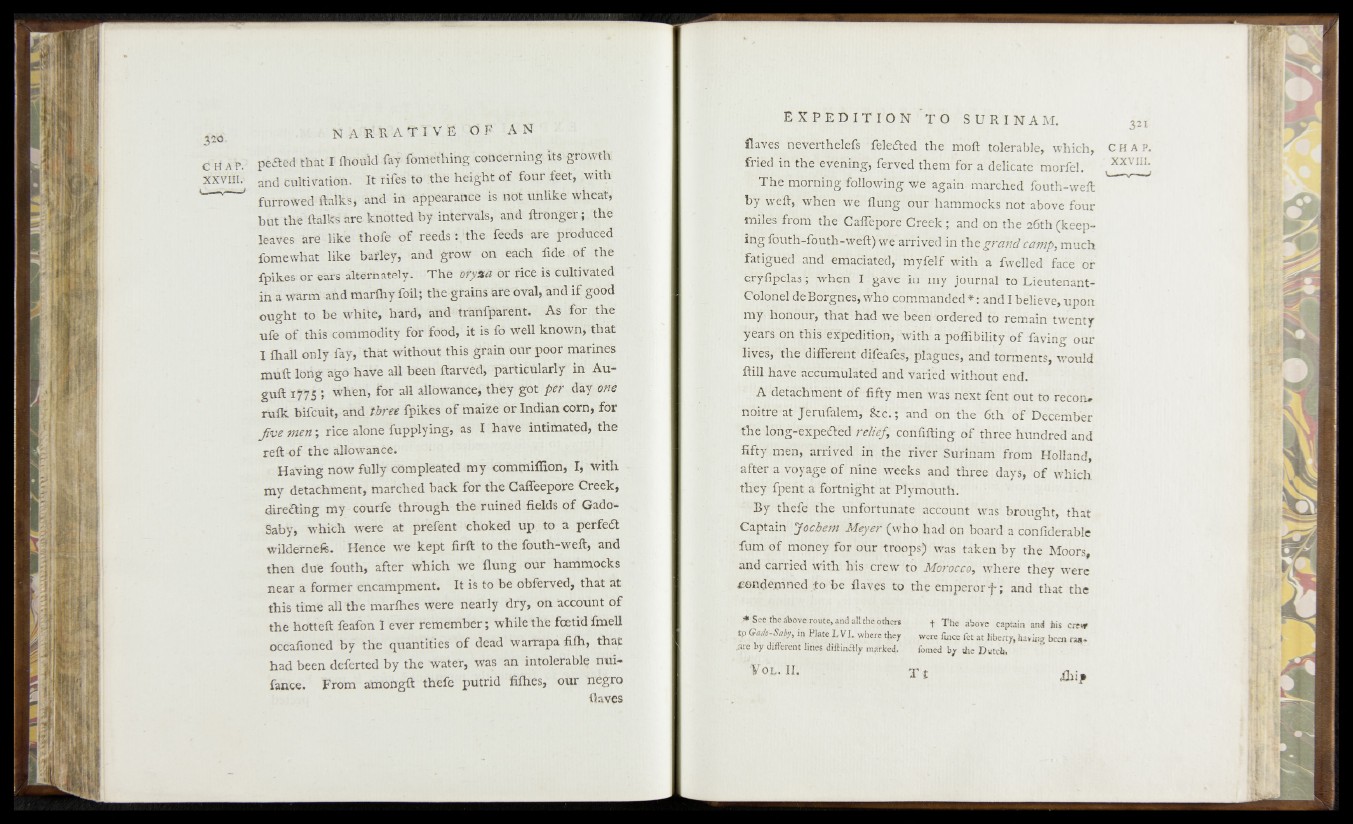
a>. pe£téd that T SfflM*? foiïietiiihg concerning- its grdwtb
XXViiL- aùd toltivàtiôû. Itïiféâ tolthë height o f foüf feet, :with
' furrowed ftalks* and in appêarahce Is hot unlike
but the ftalks are knotted by intefvâls, and ftronget ; the
leaves are like thofe o f reeds ':-»the feeds are produced
fomewhat like bafley, and grow on each fide .o f the
fpikes or ears alternately* - T ï i ë Wy%â or tick is cultivated
in a warm ahd raarfhy foil; the-gfaihs are oval, and ifgôod
ought to be White, hard, and trartfparent. As ,#or the
ufe of this commodity for food, it is & Well known, that
I Ihall only fay, that without this gfain our poor marines
muft long ago have all beeh ftârVêd, particularly in Au-
guft 1775 ; when, for all allowance, they got per day
rulk bifcuit, and three fpikes o f maize or Indian corn, for
Jive men ; rice alone fupplying, as I have intimated, the
reft o f the allowance.
Having now fully cOmpleated my commiflion, % With
my detachment, marched back for the Caffeepore Creek,
dire&ing my coude through the ruined fields o f Gado-
Saby, which were at prefent choked up to a perfeft
wilderness. HenCe we kept firft to the fouth-weft, and
then due fotith, after Which we flung our hammocks
near a former encampment. It is to be obferved, that at
this time all the marlhes Were nearly dry, oil account of
the hotteft feafon Ï ever remember ; while the foetid fmell
oceafioned by the quantities o f dead wartapa fifti, thaj:
had been deferted by the water, was an intolerable nui-
fance. From aUrongft thefe putrid fifties, our negro
flaves
flaves neverthelefs ‘felefted the moft tolerable, which, c h a p .
fried in the evening* ferved them for a delicate morfel. XXVIIL
The mornHig following we again marched fouth-weft
by weft, when we flung our hammocks not above four
miles from the Caflepore Creek; and on the 26th (keeping
IbUth-fouth-w eft) we arrived in the grand camp, much
fatigued' and emaciated, myfelf with a fwelled face of
eryfipelas1, when I gave in my journal to Lieutenant-
Colonel deBorgnes, who commanded*: and I believe,upon
my^ honour, that had we been ordered to remain twenty
yfears on this expedition, with a^offibifity o f faving our
lives, the differenfdifeafes, plagues, and torments, would
ftill have accumulated and varied without end.
A detachxnent of fifty men was next fent out to reconnoitre
at Jferufalem, & c .; ahd on the 6th o f December
the long-expecfted- relief, confifting o f three hundred and
fifty men, arrived in the river Surinam from Holland,
after a voyage o f nine weeks and three days, o f which
they fpent a fortnight at Plymouth.
" By thefe the unfortunate account was brought, that
Captain Jochem Meyer (who had on board a confiderabie
fum h f money for our troops) was taken by the Moors,
and carried With his crew to Morocco, where they were
condemned to be flav.es to the emperor f ; and that the
See the dbove.route, and all the others
Ip Gado-Saby, in Plate LVI. where they
i r e by different lines diftijiftly marked.
¥ 4 . II.
t The above captain and his crew
were liiice let at liberty, having been nu(.
ibmed by the Dutch.
T t ikip